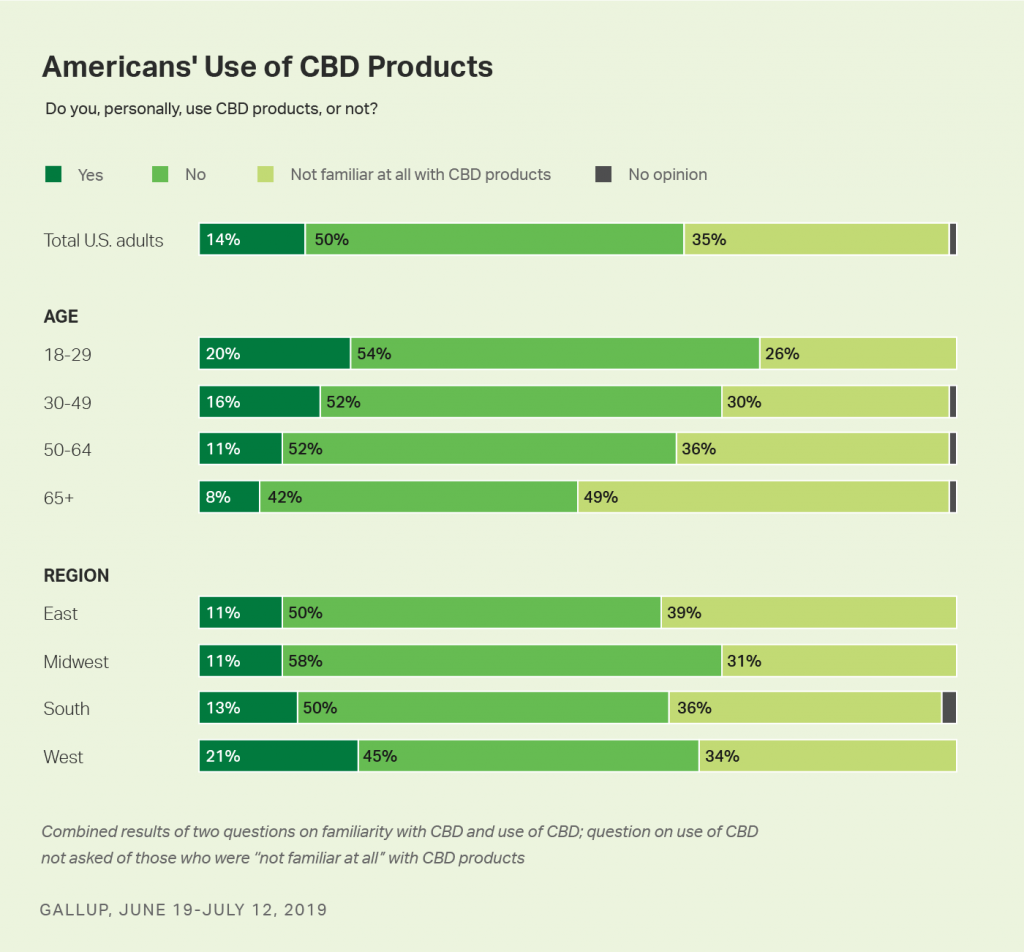AUGUST 7, 2019
14% of Americans Say They Use CBD Products
STORY HIGHLIGHTS
- 14% of Americans say they use CBD products
- 40% of users utilize CBD products for pain, 20% for anxiety, 11% for sleep
WASHINGTON, D.C. — One in seven Americans say they personally use cannabidiol- (CBD-) based products, which have proliferated since last year’s passage of a federal law legalizing this hemp form of cannabis. Younger Americans and those in the Western U.S. are most likely to report using these products, which are widely touted for their therapeutic benefits without any psychoactive effects because they contain a low level of THC.
Although CBD was legalized federally last December, the FDA is still researching it, and some states are still restricting it. While 14% of U.S. adults are using CBD products, Gallup’s June 19-July 12 polling found that 50% do not use them and 35% are not at all familiar with them. (Those who do not have any familiarity with CBD products were not asked about their personal usage of them.)
Twenty percent of adults younger than 30 say they use CBD, but usage and familiarity decrease progressively in older age groups. Just 8% of those aged 65 and older say they use CBD, and 49% are not familiar with it. This same pattern is evident in Gallup data on marijuana usage, with younger adults reporting a higher prevalence of marijuana use than is true for older adults.
Regionally, 21% of those in the Western U.S. use CBD products, compared with 13% in the South, and 11% in both the East and Midwest. Marijuana use is legal in many Western states, and CBD products have therefore been available for a longer time to residents of those states.
Why CBD Users Utilize It
While the FDA is still researching the uses and effectiveness of CBD products, marketers claim they have a wide variety of medical and therapeutic benefits. CBD users in the U.S. cite relief from pain (40%), anxiety (20%), insomnia (11%) and arthritis (8%) as the top reasons for use.
Why Americans Use CBD Products

Among men and women who use CBD products, roughly four in 10 of each say they use them for pain relief; but women are more likely than men to use them for anxiety (25% vs. 14%, respectively), and men are more likely than women to use them for help in sleeping (15% vs. 8%).
| For what condition or purpose do you use CBD products? | % |
| Pain (nonspecific) | 40 |
| Anxiety | 20 |
| Sleep/Insomnia | 11 |
| Arthritis | 8 |
| Migraines/Headaches | 5 |
| Stress | 5 |
| Muscle spasms/Soreness | 4 |
| General health (nonspecific) | 4 |
| Mental health/PTSD/ADHD/Neurological disorders | 4 |
| Recreational | 4 |
| Depression | 2 |
| Skin care | 2 |
| For pet | 1 |
| Gastrointestinal/Digestive issues | 1 |
| Inflammation | 1 |
| Other | 7 |
| No opinion | 1 |
| Based on U.S. adults who say they use CBD products. Percentages add to more than 100% due to multiple responses. | |
| GALLUP, JUNE 19-JULY 12, 2019 |
Bottom Line
Since the 2018 Farm Act legalizing the cultivation of hemp was signed into law last December, many CBD-based products have hit the market, but the large majority of Americans are not yet familiar with them or don’t use them. Those who say they use them do so primarily to treat pain, anxiety, and sleeplessness.
Older Americans are less familiar with CBD products and less likely to be using them now. As the FDA begins to regulate CBD products and if they become more mainstream, older Americans may stand to benefit the most from them for the treatment of the aches and pains that come with age.
BY MEGAN BRENAN